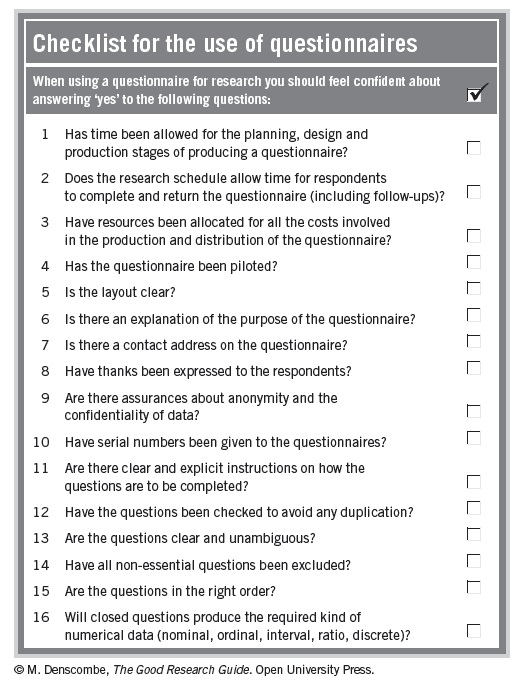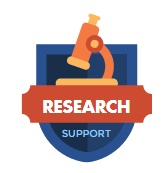- Home
-
Teaching
- GP6193 Asas Teknologi Pendidikan
- GB6022 Academic Writing 2
- GE1153 Computer in Education
- GE2153 Educational Technology
- GA2123 Innovation & Technology in Teaching and Learning
- GE3403 Photography
- GB6013 Research Methods
- GE6433 Seminar Aliran Terkini dalam Pengajaran Sumber dan Teknologi Maklumat
- GE6543 Teknologi Maklumat dalam Pendidikan
- Supervision
- Publication
- e-Learning Support
- RESEARCH SUPPORT
- When My Mind Speaks
|
Assalamualaikum warahmatullah .. semoga Jumaat penghulu segala hari memberi seribu keberkatan buat kita semua insyaAllah .. Baiklah, hari ni kita dalam mood Bahasa Malaya ye! Izinkan saya berkongsi sedikit tentang perkara yang perlu dititikberatkan sebelum kita membina soal selidik. Perkara paling penting yang perlu difikirkan sebelum mereka bentuk soal selidik kita adalah dengan meneliti semula objektif kajian. Maksudnya di sini, soalan-soalan dalam soal selidik hendaklah mengambil kira objektif kajian agar jawapan daripada soal selidik akan akhirnya menjawab persoalan kajian kita – dan secara tidak langsung memnuhi kehendak objektif kajian. Beberapa langkah yang perlu kita renungkan sebelum membangunkan soal selidik termasuklah:
Di bawah ini pula merupakan senarai semak yang mengandungi perkara-perkara yang perlu disemak ketika soal selidik dibangunkan. Sumbernya ada tertera di bawah rajah. Saudari Rohaila ada bertanya tentang sama ada perlu atau tidak beliau merujuk kepada teori/model yang digunakan sebagai dasar penyelidikan dalam pembangunan soal selidik ini. Kebiasaannya sebelum pembangunan soal selidik dijalankan, proses penting yang harus dilakukan oleh penyelidik tentulah dengan membuat sorotan literatur, kerana melalui proses ini kita akan dapat mengenalpasti bukan sahaja objektif, metodologi, sampel serta dapatan kajian terdahulu, tetapi kita juga dapat mengenalpasti teori-teori yang sesuai dengan bidang kajian kita.
Apabila kita telah mengenalpasti teori yang hendak digunakan sebagai dasar dalam kajian, serta elemen dalam teori tersebut termasuk dalam aspek pengukuran (persoalan kajian/ hipotesis kajian) maka perlulah kita memasukkan elemen-elemen daripada teori tersebut dalam soal selidik kita. Misalnya, Ely's Conditions yang menggariskan lapan kondisi yang diperlukan dalam merangsang penggunaan inovasi. Kelapan-lapan perkara tersebut boleh diterjemahkan ke dalam bentuk soalan soal selidik. Begitu juga dengan model RIPPLES misalnya yang menggariskan lapan aspek penggunaan teknologi yang boleh dijadiakn sandaran dalam pembangunan item-item soal selidik. Wallahua'lam :) xoxo
3 Comments
Assalamualaikum dan selamat bertemu kembali!
Today I am in the mood of sharing a bit about the selection of research methodology. I came across many students who admitted to me that the selection of their research methodology was actually based on what they feel like doing! "Saya nak buat kuantitiatif, kerana bagi saya kajian kualitatif memakan masa yang lebih panjang!" ("I want to do a quantitative research as I think that conducting a qualitative research will consume more time.") "Saya tidak sukakan statistik jadi kajian saya akan dijalankan menggunakan kaedah kualitatif sahaja." (I don't like statistics, therefore, I will be conducting my research using a qualitative apporach"). Sounds familiar?! Well, guys, the basic question to be asked when you to select your research methodology is "How am I going to find out the answers to my research questions?". The following question you might ask yourself before selecting your research methodology is "What kind of data suits my research questions?" These questions will then lead you to the right decision as by asking this questions you will need to list down few things to be considered: - What kind of data do I need? - Who will be my respondents? - Do I need to have a prolonged engagement with my respondents? - How much data do I need? - Does the finding meant for generalization or do I just want to explore certain phenomena? - How depth do I want to research my subject? - and the questions may go on and on. What you learn here is that, to select an appropriate research methodology, you need to really sit down and ask numbers of questions critically. If your research is about understanding how single mothers cope with the increase of tax for example, you might what to have a deep conversation with these single mothers so that you will find the truthful answers. In this case, you may use interpretevist approach in which you select your respondents purposively. You may then accept their answers from an emic perspective. But if you want to have an understanding of teachers' acceptance or rate of adoption towards the use of a new technology innovation in teaching and learning e.g., mobile apparatus perhaps, you might consider conducting a survey that involve a larger number of teachers from several part of the country and of course, the selection of your research sample will be representative of the whole population. i.e., all teachers in the country. In this approach, you as a researcher need to set up everything - from the questions to the answers (questionnaire items and answer options) and this what we call an epic perspective. The key point here is that - never choose whether it will be quantitative or qualitative until you are sure of the nature of data that you need to answer your research questions! Hope this gives you an insight to revisit your research methodology before it is too late ^___^ xoxo 'sAssalamualaikum and greetings! Attending a viva voce is not something that all of us been longing for isn't it! We heard many versions of viva session from our seniors or perhaps our own lecturers. From those stories, we know that individuals have different experiences in their viva... and the factors that resulted in the sweetness or bitterness in their stories may vary as well! Alhamdulillah .. today somehow I gained a strength to create another blog which I decided to name it as 'Research Support' as it is meant for providing supports to all my students our there about doing research - no matter in what phase you are in now. InsyaAllah this blog will be operating actively, consistently with Allah's Will .. To start with, let me share with you my viva report (which I accidentally found while searching for something else!): It was somewhere in 2013 but until now, I haven't had a chance to share my experience during my viva voce. InsyaAllah, in the future I will sharing with you the mixed feelings that I faced during that most precious time in my life as a PhD student. Until then, keep reading and please feel free to write your questions regarding the topics to be posted in the next entries. xoxo |
Archives
December 2023
Do your search here:Categories
All
|
Connect with me:Department of Learning and Teaching Innovations Faculty of Education Universiti Kebangsaan Malaysia 43600 Bangi Selangor MALAYSIA |
Site map: GE1155 Computer in Education GE2153 Educational Technology GE3404 Photography GA2123 Innovation & Technology in Teaching and Learning GB6013 Research Methods 1 GB6663 Pengajaran Pembelajaran Berbantu Komputer GE6433 Seminar Aliran Terkini dalam Pengajaran Sumber dan Teknologi Maklumat GE6543 Teknologi Maklumat dalam Pendidikan Research Support e-Learning Support Publication Supervision Awards When My Mind Speaks Guestbook |

This work by Dr. Fariza Khalid is licensed under a Creative Commons Attribution-NonCommercial-ShareAlike 4.0 International License.
Based on a work at www.farizakhalid.com.
- Home
-
Teaching
- GP6193 Asas Teknologi Pendidikan
- GB6022 Academic Writing 2
- GE1153 Computer in Education
- GE2153 Educational Technology
- GA2123 Innovation & Technology in Teaching and Learning
- GE3403 Photography
- GB6013 Research Methods
- GE6433 Seminar Aliran Terkini dalam Pengajaran Sumber dan Teknologi Maklumat
- GE6543 Teknologi Maklumat dalam Pendidikan
- Supervision
- Publication
- e-Learning Support
- RESEARCH SUPPORT
- When My Mind Speaks




 RSS Feed
RSS Feed
